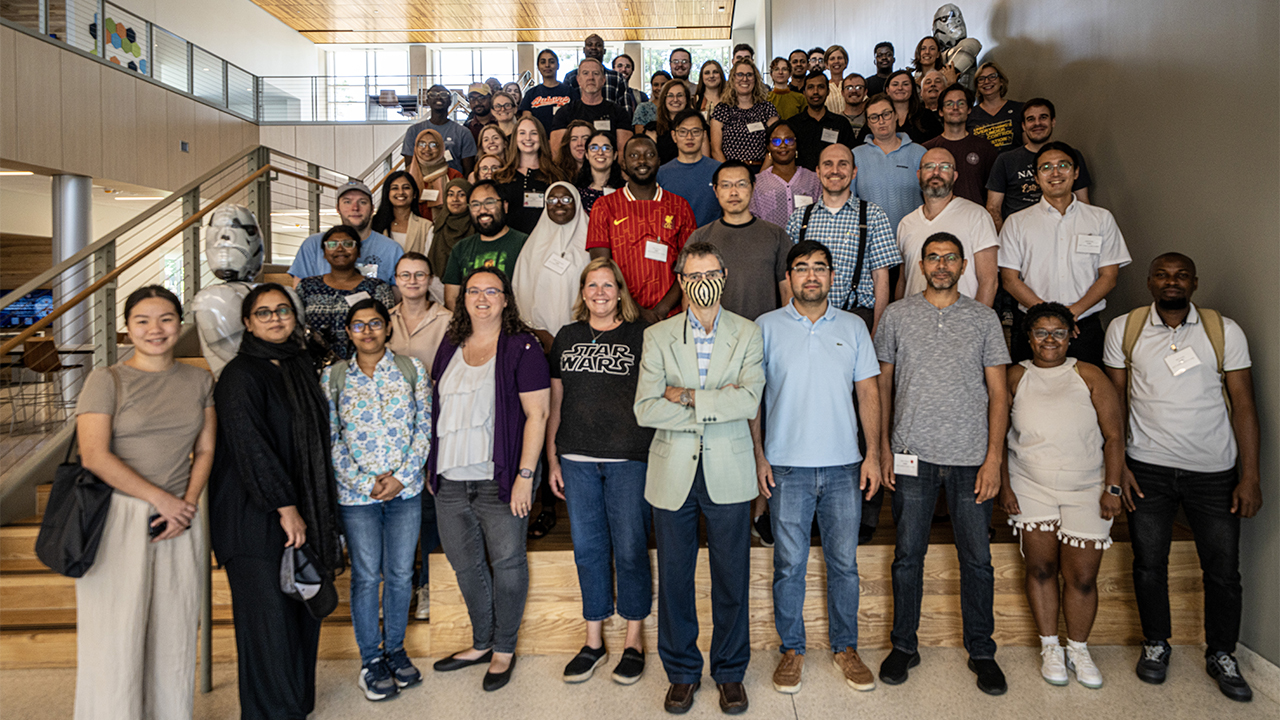content body

Participants of the Auburn University Summer STEM Institute (AUSSI) gathered for a group photo during the weeklong program.
In the College of Sciences and Mathematics (COSAM), teaching isn’t just about mastering the material. It’s about helping students make sense of it. That’s the driving idea behind a growing summer program that’s changing how Auburn’s STEM educators approach the classroom.
The Auburn University Summer STEM Institute, or AUSSI, is an intensive weeklong program designed to train educators in scientific teaching — evidence-based strategies that focused on student engagement, belonging, and meaningful learning. Now in its second year, the workshop is co-led by Stephanie Shepherd, associate professor in the Department of Geosciences; Rachel Prado, senior lecturer in the Department of Chemistry and Biochemistry and a Biggio Faculty Fellow; and Associate Director of Educational Development Lindsay Doukopoulos.
“We are all teachers,” Shepherd said. “Some of us lead lectures, some teach labs, others guide small groups. But in COSAM, we see all of that as teaching. This workshop brings everyone together as peers, regardless of title.”
That spirit of shared learning resonated with faculty across departments. Katie Rush, assistant professor in the Department of Chemistry and Biochemistry, said she was drawn in by her colleagues’ enthusiasm.
“Seeing the excellent teaching in my department was a big motivator to learn more about implementing these strategies myself,” she explained. “I was also preparing to teach my first large undergraduate course at Auburn and wanted to see ideas for running an engaged classroom with 125–150 students, in which it’s impossible to talk one-on-one with each student.”
AUSSI is supported by the Office of the Provost through a partnership with the Biggio Center and by a National Science Foundation grant focused on improving undergraduate STEM education. The workshop is intentionally interdisciplinary and brings together faculty and graduate students, as well as staff who contribute to student learning, to create a unique space where everyone who teaches can learn from one another.

The Auburn University Summer STEM Institute fosters an active learning environment where faculty, staff, and graduate students share strategies for student engagement.
Participants engage in active learning from the start, building lesson segments called “tidbits” based on backward course design and student-centered practices. By the end of the week, they present their tidbits to the entire group for feedback.
“We practice what we preach,” Prado said. “We’re not standing up and lecturing all week. We’re modeling the kind of interactive, student-centered techniques we want them to use in their own classrooms.”
For Rush, the chance to try out strategies in a supportive environment made all the difference.
“AUSSI had a huge impact on refining the strategies I’m using in my teaching by providing a place to practice certain strategies and get immediate feedback from other practitioners,” she said. “My discussion-based graduate course became more streamlined, and I was more confident facilitating classroom activities and discussions. At the undergraduate level, I felt that AUSSI gave me a ‘menu’ of teaching ideas and the information to choose what would work best for my topic and classroom.”
That kind of immediate, practical impact is what the organizers hope every participant takes away. The experience benefits new instructors and seasoned faculty alike. Some participants, like graduate students, haven’t yet led a classroom. Others are refining courses they’ve taught for years.
“We had a conversation where grad students were feeling nervous because they hadn’t taught yet,” Shepherd said. “But we reminded them that they’re the experts on being a student. You can use that expertise now to build something better before you ever step into a classroom.”
The format also fosters community. Participants are grouped by discipline, encouraging collaboration within and across departments. That sense of shared purpose continues after the workshop ends.
“We want to create a learning community,” Prado said. “We meet during the semester, talk about what’s going well or what challenges have come up, and help each other work through them. Everyone leaves knowing someone they can call.”
Faculty who return often become facilitators, mentoring new participants as they refine their own teaching practices.
AUSSI also supports Auburn’s land-grant mission to expand access to education and serve the public good through teaching, research and outreach. By equipping educators to build inclusive, student-focused classrooms, the program reflects COSAM’s Be BOLD initiative and its commitment to helping every student feel welcomed, respected, valued and engaged.
“It’s about helping every student feel welcomed, respected, valued and engaged,” Shepherd said, “and preparing our educators to make that happen.”





